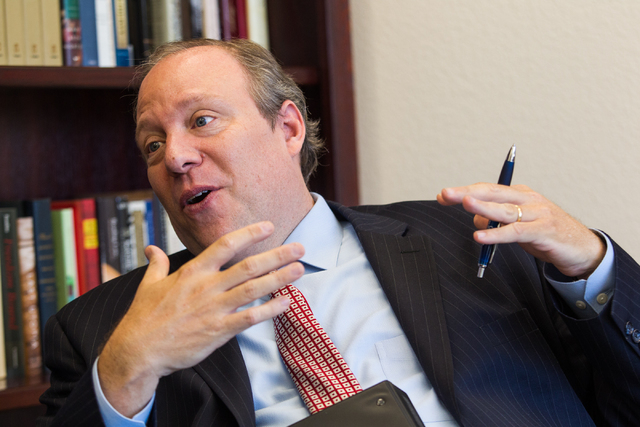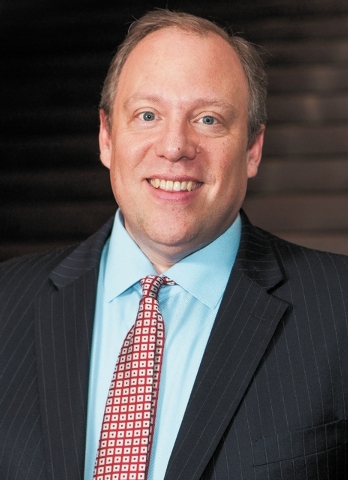Nevadan at Work: Lawyer made decision to teach
A s a kid, Dan Hamilton knew that the practice of law was “in the air and the water” of his hometown of Washington, D.C. Whether members of Congress or lobbyists, most people working on Capitol Hill had law degrees.
But three years as a history teacher at the Maret School in Washington changed his career path. Hamilton is a lawyer, but instead of the daily grind of client meetings, trials and legal briefs, he chose academia.
“The question for me was, ‘Am I going to be a political guy or and academic?’ ” Hamilton said. “It was really the teaching of high school that (made) me want to read, write and do scholarship. I wanted to teach.”
His passion for teaching allowed him to enjoy two of his professional passions, law and history.
Hamilton received his doctorate in American legal history in 2003 from Harvard University. He was a Golieb Fellow in legal history at New York University School of Law for the 2003-04 academic year.
“It reveals the present and links to our lives in ways that are really striking,” Hamilton said. “History connects you with something much larger than yourself. It also is totally disconnected from the present, meaning it is its own world.”
Today, Hamilton has settled in to his job as dean of UNLV’s William S. Boyd School of Law and Richard J. Morgan Professor of Law. He joined Boyd in July. His first day on the job, the temperature reached 116 degrees, a drastic change in the weather from Champaign, Ill., where he was an associate dean with the University of Illinois law school.
Hamilton has already put his stamp on the law school. He is working with local law firms and faculty to build a gaming law program that will offer executive training programs and a postgraduate law degree.
He also revived the Gaming Law Advisory Board and is reaching out statewide to attract the best and brightest to Las Vegas.
“Let me be clear, we are the law school for the state of Nevada,” Hamilton said. “There are terrific students at Reno. I’ve been to Fallon, and I’m headed to Ely. If there is a student in the state that would benefit from a Boyd legal education, I want them here.”
Question: What was attractive about UNLV’s Boyd Law School?
Answer: Boyd is a great success story that is known in legal academia. What Dick Morgan, John White and Nancy Rapoport helped build here is one of the top public law schools in the country in a span of 15 years. That is very impressive. What (they) did was recruit a great faculty and that is what has just propelled the school. When you have that great faculty you can draw great students, you have great alumni and it builds on itself.
Question: So that success makes Las Vegas attractive?
Answer: Yes. But several other things make it attractive. Its success makes it attractive. It is the law school for the state of Nevada. So we are the one and only … and we serve the whole state. We draw from the whole state, and we want to draw more regionally. So it’s well-positioned inside a growing, dynamic state and the legal community has totally embraced it. It was built with the support of people that didn’t go here, but by people who believe in a law school and that is a very special case.
Question: How do you transform Boyd into a regional law school?
Answer: You need to continue to attract and recruit top faculty. That’s job one. We need to ensure that the caliber of our student body is maintained and that is harder and harder to do in an era where law school applications are decreasing. … The place where we can grow most strategically is in building out our graduate gaming law initiatives.
Question: Why are law school applications declining?
Answer: Three reasons. More and more legal work can be automated. We can now do discovery on computers. More and more legal work is going offshore to other parts of the world, even different parts of the country. And third, now that we have had several years of a tight job market there is a glut of lawyers on the market.
Question: Why focus on gaming law?
Answer: The growth in law schools is on the non-J.D. (juris doctor) side, meaning that the market for J.D. students is shrinking and probably isn’t done shrinking. We need to compete aggressively to get as many top J.D. students as we can, but at the same time we need to build out other programs, including new kind of initiatives for lawyers and nonlawyers who need to know more about gaming law to stay current and trained. And right now there really isn’t that offering in the marketplace. We want to offer different degree programs in gaming law and executive education in gaming law, and we think this is a natural fit for UNLV both as a law school and a university.
Question: Is there enough demand?
Answer: Gaming law is booming and very sophisticated. It’s labor law, it’s securities law, it’s criminal law, and all kinds of different of corporate law. Gaming is booming nationally and internationally, so we have the expertise in this city and state to really become the national leader.
Question: Where is the school’s gaming law program now?
Answer: We have a number of terrific adjunct faculty who teach gaming law. But this year we are beginning to roll out new initiatives … executive education and different kind of degree programs. So we want to work with our partners on campus and in the community. We have revived our Gaming Law Advisory Board and have recruited many of the top lawyers and regulators to sit on the board. We hope to have this up and running in stages over the next couple of years.
Question: Is there another area of study the school is looking to expand?
Answer: We have terrific intellectual property faculty and intellectual property is a growing part of the Las Vegas economy. With all the Internet gaming laws that are being passed, we are in a very strong position. We are very strong in constitutional law, but we need to be more responsive to what lawyers are asking for. I’m going around town meeting with law firms and what I hear from them is there is more of a need for lawyers with specialized knowledge. Nevada corporate law is one area. There are unique sets of laws that are important as Nevada is growing more corporations. We need to have lawyers that speak to that growing market.
Question: Is there a role for online courses at Boyd?
Answer: Sure. The online or distance learning component in legal education is tightly regulated by the American Bar Association. We have a fairly limited number of courses that we can offer online right now. That might change in the future as the bar realizes that it needs to think more and more about how students are learning today. Having said that we aren’t currently using enough of the credit hours we are allowed to use. And we should do more, and we will do more because it is one way to help students with the cost of law school and it is where education is going.
Question:You mentioned cost. What is the cost of a Boyd education?
Answer: Sticker price is $23,900. That is in-state, and students can transfer to in-state after their first year. That is before we scholarship aggressively. And we need to scholarship aggressively. Students now are in a position where they can negotiate with law schools about their price and we need to be in that game. Part of my job is to make sure we remain competitive on the scholarships we offer. That price point is very compelling … we are now in many instances half the cost of many of our competitors. That’s part of our mission as a public law school is to stay accessible, stay affordable.
Contact reporter Chris Sieroty at csieroty@reviewjournal.com or 702-477-3893. Follow @sierotyfeatures on Twitter.


















